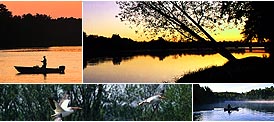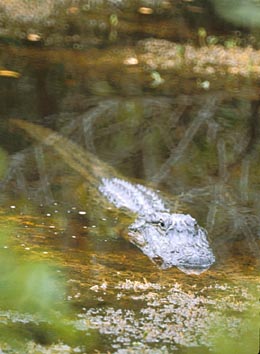

| | 
Angler's Attention
by Cameron Larsen
There is something that I have called 'angler's attention'. It is developed after you have been fishing, and in this article we will be concerning ourselves with fly fishing, for years and years. You can usually tell those that have it and those that don't. Quickly rigging up your fly rod, and racing to a likely fishing spot, solely concerned about yourself and your gear, are telltale signs of someone not possessing angler's attention.
I spent many years, especially when I didn't have much time to fish, ignoring angler's attention. If I could steal away even an hour or two, racing down to the river I would go. In a virtual panic, scouring out my favorite fishing spots, then cursing to myself, when they were taken. Frantically I would find a spot to fish, splash out there, and heave out my line. Fishing, at last, my heart would race, I would set the hook on any minute bump, and then have to untangle my line from a tree lurking behind me. Never paying attention to the fly I was using, there wasn't time to change it, whether my tippet was proper, what was happening on the water, nothing of the sort. Just get me to the water, and let me wet my line.
Maturity probably plays as much a part in developing 'angler's attention' as anything. Although I have seen many young angler's very deliberately observing and then selecting their approach. Besides natural aging what really changed things for me, was actually observing a fellow fly fisher. Actually it was more observing him, observing me. I was fishing a small stretch of fairly remote river. Although this particular spot became 'discovered' sometime in the 90's, it is still relatively pressure free after mid-June. Happily casting to rising fish, I happened to spot a gentleman standing on the bank watching me fish. He was quite a bit older then me at the time, but his presence somewhat annoyed me. Feeling watched, I gave it another five minutes or so, then headed in.
The next thirty minutes or so were spent discussing fly fishing with this gentleman in ways I had never thought of before. The knowledge this man possessed and frankly the lack of urgency to wet his fly were astonishing. He seemed quite as content to stand and talk about fly fishing as he was to actually be out doing it. He discussed with me clouds and mayfly hatches, the current time of the Callibeatis hatch, the onset of the Giant Stonefly hatch based on elevation, water flow, and air temperature, the need to have your fly drift naturally. The benefit of watching the naturals on the water, the effect of line drag, etc, etc.
After I had finished my lunch, did he finish talking. And then asked if I wanted to give it another try, motioning out to the water. I told him to go ahead, it must be his turn, and he said there was room for two. He was definitely a talented caster, one of the best I had ever seen, gracefully placing his dry fly expertly in the feeding lanes, on the edges of deep pools, and right below large rocks that were all favorite holding places for trout. Stopping when the hatch slowed and beginning again when the hatch began.
From this experience, I have deliberately honed my own angler's attention, and marvel not at what I notice, but what goes unnoticed by many. And many think it is unnecessary information, figuring they will catch fish using the same tactics they always have, or there just aren't fish to be had that day.
For those that routinely ignore the hints that Mother Nature is giving you in solving the what will fish hit today puzzle. Next time try taking a few minutes to observe the minute details of the place you are fishing. Start with the big picture, the water flow, clarity, time of year, guess at the water temperature (some take a thermometer), consider the time of day, the air temperature. Then look closer, look at the current world of the fish you are trying to entice. Turn over a few rocks, look at the bugs there, some take a screen and place it in the current to view the offerings fish are being presented with. Observe the surface of the water, check for dimples, for feeding fish right below the surface. Actually spotting fish in the water takes practice. Then look for hatching insects, for insects laying eggs over the surface, and of course that greatest of all fly fishing prizes the rising fish.
Observe it all, not just before fishing but the whole time, watch for nuances, changes in the air temperature, changes in the sunlight, the hatches, the surface activity. Are you hooking up deeper, shallower, suddenly less frequently. Be a part of the fly fishing equation, at peace with it, in harmony with it, and you will be amazed how much more you enjoy it.
As you go along, you will find yourself unable to look at any river or lake, without observing it in this way. Even if you are just driving by it. You will be amazed at the hatches you can observe from your car, you will find yourself analyzing the bugs on your windshield. Angler's Attention will just be the way you look at the entirety of the fish, insect relationship, and everytime you find yourself fly rod in hand, you will be the better fly fisher for it.
About the Author
Cameron Larsen is a retired commercial fly tier and fly fishing guide. He now operates The Big Y Fly Company. http://www.bigyflyco.com/flyfishinghome.html He can be reached at info@bigyflyco.com. This article will appear in the Big Y Fly Fishing E-Zine at Http://www.bigyflyco.com/Bigyflyfishingezine.html
|















